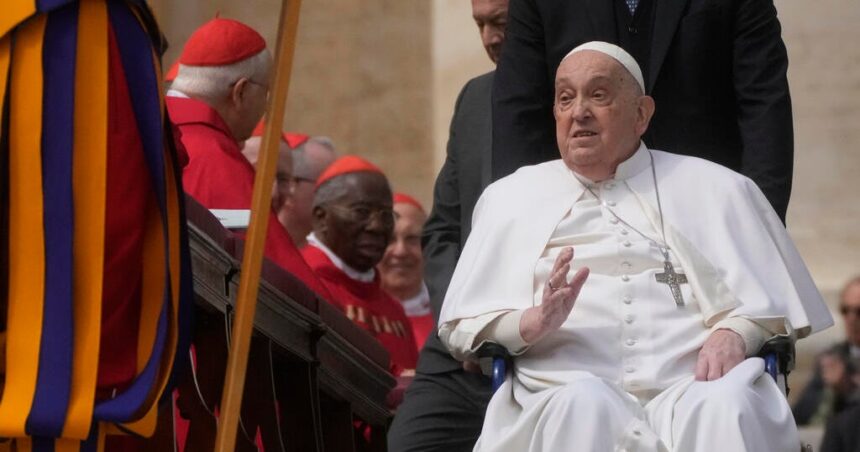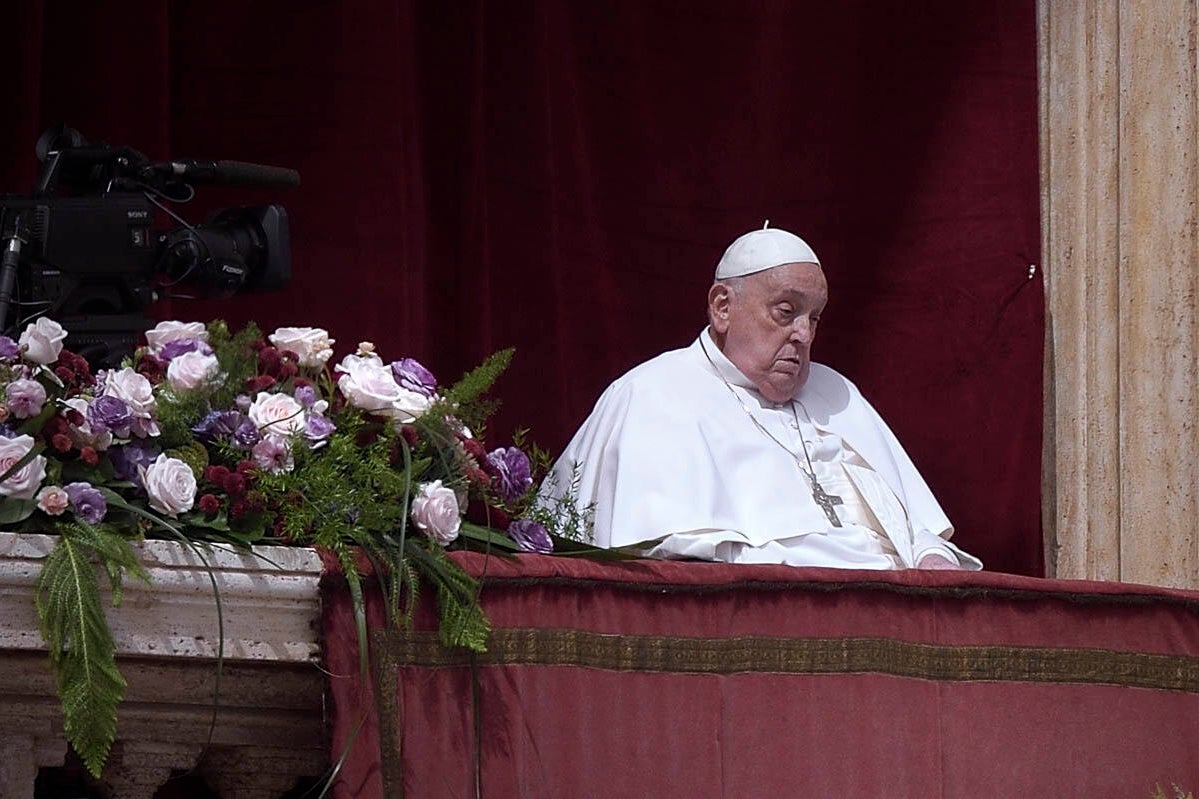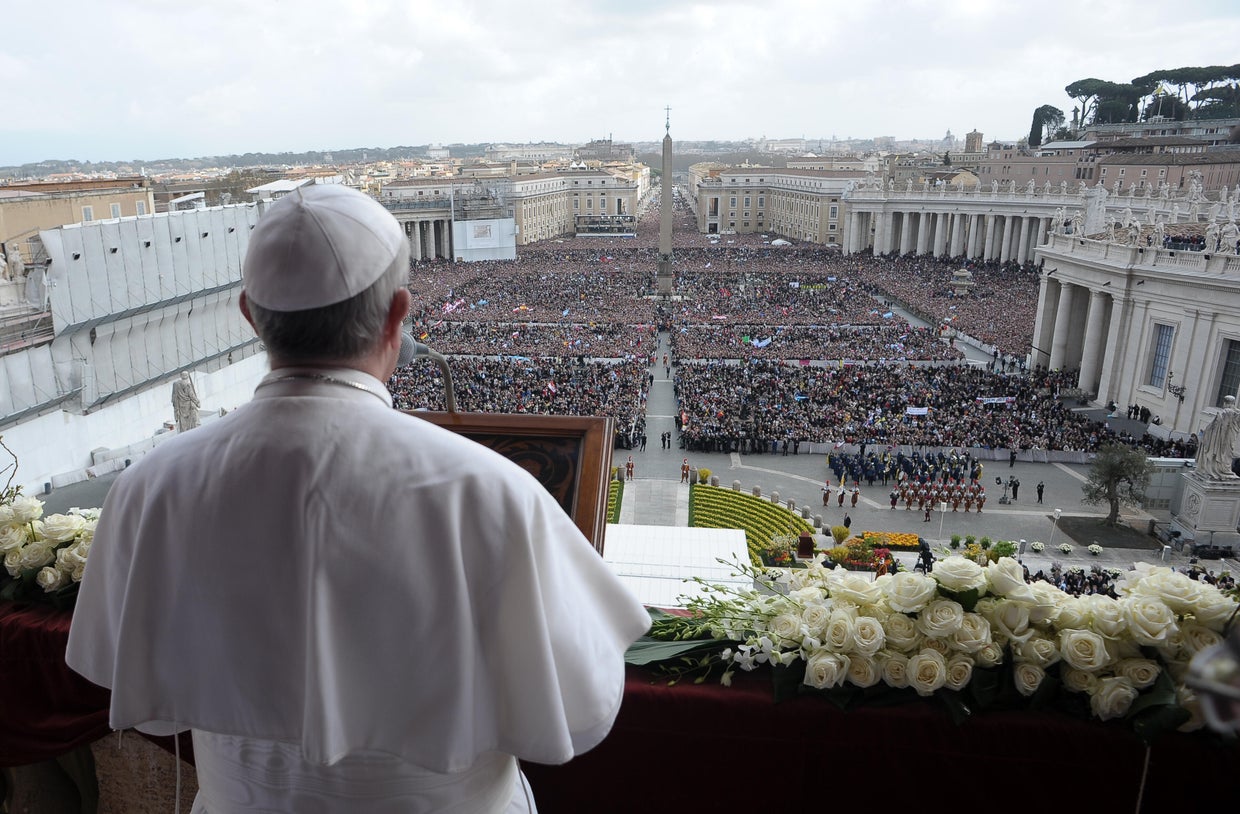Rome — He was a populist leader, often referred to as the “People’s Pope.” As pontiff, Francis, who died Monday at age 88, sought to bring the Church closer to the people, stating early in his papacy that he wanted to have a poorer Church “for the poor.” He was known for being driven around in unflashy cars and for making folksy gestures, like taking trips into Rome to buy an item at the store.
He was brilliant at playing to the press, creating the sorts of photo-ops that would draw attention to his areas of interest. He’d often speak extemporaneously while on papal voyages, particularly toward the beginning of his papacy, fielding questions on the flight.
That made his papal trips a must-attend event for the press covering him. For those of us who got to travel with Pope Francis, we could see how he’d interact over the course of days with various dignitaries and his wider flock of the faithful. He’d appear particularly energized and engaged, lighting up when with children or in an audience with those who were cast aside, living on the margins of society.
He died just a day after surprising many with a brief appearance in St. Peter’s Square on Easter Sunday, blessing thousands of people and sounding stronger as he did so than he had since his release from a Rome hospital at the end of March.
Stefano Spaziani/Europa Press via Getty Images
We wanted to look back on his papacy, his legacy, and also look forward to the next pope, so we asked veteran Vatican correspondent Francis X. Rocca to meet recently on the terrace of a convent in Rome, with a spectacular view out over St. Peter’s Basilica, for a chat about Francis.
We look back, and ahead. Below is a partial transcript from our conversation, which has been edited for clarity.
SETH DOANE: What is Pope Francis’ legacy?
FRANCIS X. ROCCA: Well, I suppose it depends on whom you ask. I mean, for women, for example, he certainly was someone who brought women in the Vatican, and gave them higher positions than had ever been the case. It’s still a relatively small number, but that was certainly a very dramatic change. For conservatives, he started by giving them heartburn and ended up by giving practically a heart attack. It was quite a dramatic confrontation. In some ways was a polarizing pope. At the same time that he really pushed the envelope and allowed things to be spoken about that had been considered closed, whether on sexual ethics, on medical ethics. … In a way, because of his very informal style of discourse, talking to journalists, giving interviews, press conferences, he seemed to give permission to people to criticize him, too, even if that wasn’t his intention. So the debate became much more heated during his pontificate.
SETH DOANE: Why was Pope Francis seen as such a divisive figure? Why did conservatives dislike him?
FRANCIS X. ROCCA: Well, I think there were a number of reasons. One is that he had a very loose attitude toward tradition, let’s put it that way. From the very beginning, when he stepped out on the loggia in the front of St. Peter’s Basilica, and he didn’t wear the red cape that was customary on that occasion — before he even said a word, already people started to get nervous, conservatives started to get nervous that he was just not going to respect tradition.
Alessandra Benedetti/Corbis via Getty Images
And he broke it in small ways like that, but he also tested it in bigger ways. And, for example, relatively late in his pontificate, gave permission for the blessings of same-sex couples. They tried to present that as something that was consistent with tradition, but it certainly wasn’t seen that way by conservatives. And especially in Africa, where basically all the bishops of sub-Saharan Africa protested and wanted a kind of exemption from this new permission, which is extraordinary. And that’s just a very clear illustration how divisive things became, when you have an entire continent — a continent where the Church is growing very quickly — taking a completely different stand from other parts of the Church. That happened under Pope Francis, and it happened because he made a bold move.
SETH DOANE: Conservative Catholics in America were some of his loudest critics.
FRANCIS X. ROCCA: Yes, that’s right. He had a the majority of the U.S. bishops were not on board with his priorities, I think that’s pretty clear. The pope and his allies among the U.S. bishops, who are a minority, wanted to play down abortion. The pope hated abortion, but he wanted to play [it] down, with respect to social and environmental and economic issues, or at least put them on an equal plane. That’s maybe the better way to put it. The U.S. bishops have for years said that opposition to abortion is their “preeminent priority.” And the pope and his allies didn’t want that, and they weren’t able to persuade the majority of U.S. bishops about that, and that became a very, very big point of tension.
SETH DOANE: We traveled with the pope together. One of the things that struck me was how he was with kids — he would kind of come alive in a way.
FRANCIS X. ROCCA: He was very approachable. He was very informal. That was the — one of the beguiling, charming things, charismatic things about him. His predecessors are — John Paul was a very charismatic figure, very telegenic, but he was not so relaxed. And Pope Francis had an ordinary style that appealed to people.
SETH DOANE: Pope Francis was known as the “People’s Pope.” He was known to reach out to try to pull in the masses.
FRANCIS X. ROCCA: Yeah. He was also a populist pope, with a kind of political resonance. His style was very much to try to have a bond with the people, with — implicitly or sometimes not so implicitly, against the elites, in this case, the hierarchy: the bishops and the cardinals. He kind of played off of them. And he was always sort of suggesting that the elites, even the Diocesan clergy priests and parish priests, could be aloof from their people, could be too rigid, could be too attached to luxury or to privilege. And so he was always beating that drum and saying, “No. I’m with the people.”
SETH DOANE: This pope tried to tackle sexual abuse issues within the clergy, within the Church. He tried to tackle the vast bureaucracy and economic issues in the Church. How did he do?
FRANCIS X. ROCCA: Well, I — his record on sex abuse was mixed. And I think actually not up to the level that people had expected of him. He had a kind of a distaste for disciplining the priests and bishops compared with his predecessor, Pope Benedict. Pope Benedict the high water mark in terms of discipline of abusive clergy. Pope Francis stepped back a bit from that. He got in trouble for that in Chile, when he was very stubbornly supportive of a bishop who’d been accused of covering up sex abuse. He finally backed down, but it was an embarrassment.
SETH DOANE: What were some of the big issues under Pope Francis’ papacy?
FRANCIS X. ROCCA: Well, certainly a big issue was his relative leniency on questions of marriage, the family, and sexuality. The single most famous statement from his pontificate was the one he made at his very first press conference in 2013, which was, “Who am I to judge?” He was talking, in that case, about gay priests. But he could have been talking about divorced Catholics, whom he allowed to take communion, in many cases, which had not been the practice before. He could have been talking about Catholics who use contraception. Pope Francis didn’t change teaching formally on any of these issues. But what he did was signal that it was OK to have different points of view about them, that it was not a priority — that he was not censuring anyone. And, in fact, some of his advisors here explored, for example, the possibility of relaxing the ban on contraception that had been so controversial since Pope Paul VI had reaffirmed it in 1968. So those are some issues.
Another issue: He had a rapprochement with China, which was controversial, even among Chinese Catholics, where he … agreed to share responsibility for choosing Catholic bishops in China with the Communist government there. And that was controversial. He felt that it was important to have dialogue and to keep the Church unified at some level, but a lot of the Catholics who resisted government control in China resented that and felt that he was selling them out.
SETH DOANE: One of the regular criticisms of this pope was that he sowed confusion. Why was that heard so often?
FRANCIS X. ROCCA: Well, he played with ambiguity. A lot of his statement were made in an informal manner at press conferences and in interviews, not in doctrinal documents that came out from the Vatican. And so therefore he, you know, when he says, “Who am I to judge?” — well, what does that mean? Conservatives tried very hard to read that in a way very consistent with strict tradition. And you could if you wished. But the pope was very media savvy. He knew how his comments would play. He knew how his soundbites and headlines would play, and so when he made a statement like that, he knew that most people would read that as meaning that sexual morality, or at least in that case, was a matter of conscience, that people could follow their own conscience. That’s not explicitly what he said, but when he said, “Who am I to judge?” he seemed to be saying, “This is a private affair, this is someone with his own conscience.” And that’s how many people read it, even if he didn’t explicitly say that.
SETH DOANE: During his papacy, Pope Francis changed the feeling of the Church. You saw him driving around in simple cars, sometimes going out into Rome to buy something at a store. The feeling of who a pope is changed even in where he decided to live, at the Santa Marta Hotel, and not in the Apostolic Palace.
FRANCIS X. ROCCA: Yeah, that’s right, even wearing, you know, ordinary black shoes, or having his Argentinian passport renewed, wearing the white skull cap in the photo. That’s true: He was definitely very deliberate. He wanted to make the pope seem more with the people, and to pull down some of the barriers. And that’s why he had a very tactile, approachable style. It will be interesting to see if his successor feels the need to maintain that, or will go back to something more traditional and more formal.
SETH DOANE: In the long arc of the Church’s history, how much will Francis’ papacy really have changed?
FRANCIS X. ROCCA: Well, the long march of papal history is very long indeed. One thing is he was the first pope from the Americas, and the first pope from the Global South. So he’ll always have a place in the history books for that reason. Beyond that, it depends on what happens next. I mean, if the next pope is going to carry forward his progressive approach, and if that’s going to continue and change the Church, and Church teaching is going to change on things like women’s ordination, you know, or homosexuality, if it’s actually going to change, then he will be a historic figure in that respect. If we go back to something more traditional, then that will be a kind of an anomaly. But he will remain in the history books because of where he’s from.
SETH DOANE: Looking ahead to the next pope, did Pope Francis, if you will, “stack the decks” enough that the College of Cardinals is likely to go with a more progressive, more liberal pope? Or does the pendulum swing the other way?
FRANCIS X. ROCCA: Well, that’s always the big question. Certainly Pope Francis was notable, and even some of his supporters acknowledge this, in not choosing people who didn’t agree with him as cardinals. He tended to choose people like that. On the other hand, he chose a lot of people from far-flung regions, from places that had never had a cardinal before, about whom we know very little, and probably Pope Francis didn’t know very much either. So that’s a bit of a wild card. There’s also the issue that cardinals tend to be pretty conservative people — “conservative” with a small “c.” They tend to want not to rock the boat too much, and Pope Francis rocked the boat continually.
SETH DOANE: We could see a more conservative pope next?
FRANCIS X. ROCCA: Certainly it’s very possible that we’ll see a pope with a more conservative temperament, a more conservative governing style, a more conservative communicative style. Maybe not a hard-right conservative, in terms of doctrine, we might not get that. But we might get someone who’s going to — the College of Cardinals wants to calm the waters. It’s been a very turbulent period under Pope Francis, and so they might want someone who will just not speak quite so often to the press, not stir things up, not shake things up for a while. We could be looking at that.






